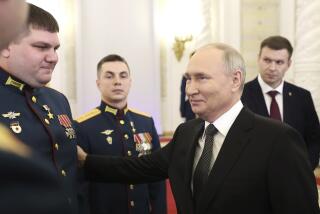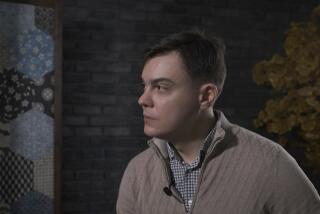THE KREMLIN : A Bleak Liberal View of the Soviet Predicament: ‘The Reforms Are Over’
- Share via
MOSCOW — Can there be reform without reformers?
Obviously not, say Soviet radicals, who see an increasing shift to the right as key liberals leave President Mikhail S. Gorbachev’s “perestroika team.”
Eduard A. Shevardnadze, in resigning last month as foreign minister, warned of the growing power of “reactionary forces” and accused them of effectively taking Gorbachev hostage and pushing the country toward a return to dictatorship.
Other liberals are equally harsh in their pronouncements. Perestroika, they argue, is “at a dead end,” even “finished.” Gorbachev’s recent confessions of “serious mistakes” in his policies and his “guilt before the working class” are read as further proof of the trend.
“The reforms are over,” Mikhail Berger, a respected economics observer of the government newspaper Izvestia, said. “We hope that they do not become just a memory. . . .
“Whatever is done is done by specific individuals, acting in specific circumstances and with specific motives, and we have lost almost all those committed to concrete reforms, namely the development of a market economy and a pluralist democracy.”
Like Shevardnadze’s resignation, these comments challenge Gorbachev to demonstrate his continued commitment to the ideals of perestroika and to reinstate liberals in the government and among his advisers.
That moment will come next week when Gorbachev must nominate a new prime minister and form a new government under terms of constitutional amendments approved last month by the Congress of People’s Deputies, the national Parliament, to strengthen his authority as president.
The key appointment will be that of a new prime minister. Even before a heart attack last week, Nikolai I. Ryzhkov was increasingly viewed as a man whose time had passed--Georgy Shakhnazarov, one of the planners of the new government system, even said so--and a political liability for Gorbachev. Still hospitalized, Ryzhkov, 61, is unlikely to return.
Most of the candidates under discussion come, as Ryzhkov did, from the Soviet Union’s powerful military-industrial complex. They include Yuri D. Maslyukov, 53, chairman of the State Planning Commission and a first deputy prime minister; Lev A. Voronin, 62, another first deputy prime minister, who has been the government’s principal trouble-shooter; Valentin S. Pavlov, 53, the finance minister, and Arkady I. Volsky, 55, president of the Soviet Scientific-Industrial Union.
Like Gennady I. Yanayev, 53, the new Soviet vice president, these are gray men, competent enough as managers within the Soviet system, yet appearing to lack the vision, charisma and political intellect to break out of it.
Reformers would like to see Gorbachev nominate a major political figure, such as Vadim V. Bakatin, 53, the former interior minister, Anatoly A. Sobchak, 53, the mayor of Leningrad, or Nursultan Nazarbayev, 50, the president of the Central Asian republic of Kazakhstan. But they contend that he would not want a potential rival in so key a post.
Whoever Gorbachev nominates will face intense grilling by the Supreme Soviet, the legislature, on his or her policies and the future of perestroika.
“Mikhail Gorbachev has chosen to rely on the faceless segment of our society, the country’s bureaucratic majority,” Berger said of Yanayev and the top candidates for prime minister.
“All this leaves the country in the hands of those who have been running it, and that’s why we say the reforms are over.”
More to Read
Sign up for Essential California
The most important California stories and recommendations in your inbox every morning.
You may occasionally receive promotional content from the Los Angeles Times.













